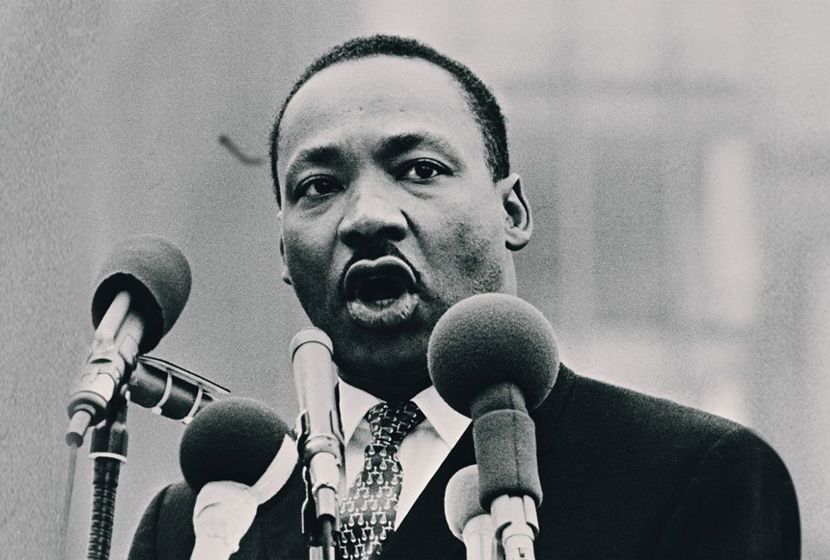Martin Luther King Jr. wrote the letter in a persuasive tone, which appealed to stand against racial inequality in the United States (US). The target audience consists of racist white supremacists and those who are victims. King uses various instances of ethos to show his credibility to readers. He introduces himself formally and links himself to historical figures. King also makes good use of pathos to trigger the emotions of readers. He shows some prevalent forms of racism and presents possible consequences in case of failure to reform the system. In turn, King uses logos to justify his actions, and he gives multiple reasons that demystify the real meaning of just and unjust laws. Finally, King covers kairos and explains to the audience that there is the right and opportune time to address the problem, while his allusions only support his claims. He questions the rules made by the white majority because Black people can no longer be outsiders. In particular, the overview of rhetoric appeals, along with King’s ability to pursue the crowd, makes this rhetorical analysis example of MLK’s “Letter From a Birmingham Jail” stand out among others.
Join our satisfied customers who have received perfect papers from Wr1ter Team.
Introduction
“Letter From a Birmingham Jail,” written by Martin Luther King Jr. in 1963, describes a protest against his arrest for non-violent resistance to racism. The audience of the letter is not only clergymen but also another part of American society. In the letter, King appeals for unity against racism in society, while he wants to fight for human rights using ethos. Similarly, King uses pathos to trigger the emotional aspect of readers and encourages his audience to take real action. Moreover, King provides various logical explanations to make his position clear and the reasons for fighting against white supremacy. The letter is reflective in tone and serves to catch both suppressed people and those who are exploiting them. In turn, King’s use of kairos and allusions places his actions in the historical context of not only his time but also the past. Thus, this critical response essay, in the form of the rhetorical analysis example of “Letter From a Birmingham Jail,” reveals King’s literary skills and his passion for perceiving equality, which he accomplishes by using ethos, pathos, logos, and kairos, avoiding logical fallacies above all.

Historical Context
The problem of racial inequality and segregation existed in American society for hundreds of years since its development. Before writing the letter, the first critical point was between 1954 and 1955 years, when there was a decision made by the Supreme Court in the Brown v. Board of Education case, which postulated that the existence of segregated public schools violated the Fourteenth Amendment’s rule of equal protection of the laws (Sturm, 1984). Moreover, in 1955, there was an accident when Rosa Parks, a Black woman and seamstress, rejected the conductor’s request to leave a bus and make room for white passengers. The result was the “Montgomery Bus Boycott” and other Civil Rights movements, which were led by King and other Black activists. They were concerned about their roles in American society and racial discrimination against them.
Peaceful Protest
In 1962, King and his followers decided to focus on the conditions that existed in the city and consider an active confrontation with the powers of segregation, issuing the “Birmingham Manifesto.” During a peaceful demonstration march of 1963 held on Good Friday, the police arrested and jailed King. As a result, Bishop C. C. J. Carpenter, Bishop Joseph A. Durick, Rabbi Hilton L. Grafman, Bishop Paul Hardin, Bishop Nolan B. Harmon, Bishop George M. Murray, Moderator Edward V. Ramage, and Pastor Earl Stallings (1963) signed their statement called “A Call for Unity” to condemn King’s actions, providing their own visions on segregation and race relations in Birmingham, Alabama. They used their authority to force King to stop the protest of the Black community.
King’s Response
The main purpose of King’s “Letter From a Birmingham Jail” was to explain himself to the public, defend the rights of Black people, and use his strategy of non-violent resistance as a way to fight racism and segregation. By responding to the arguments made by eight white clergymen, King wrote his public letter as a rhetorical form to defend himself and the rights of Black people (Fulkerson, 1979). In turn, the peaceful protest intends to create a non-violent direct action that leads to a crisis, establishes tension, opens the door to negotiation, and confronts the issue of the unremitting perseverance of racism in American society. King justifies the issue of civil disobedience, uses his example of rhetorical analysis, and emphasizes the urgency of fighting injustice and people’s moral responsibility to oppose unjust laws, making the letter a historical document in the Black struggle for civil rights.
Summary of King’s “Letter From a Birmingham Jail”
In his rhetorical piece “Letter From a Birmingham Jail,” King writes to clergymen representing Roman Catholic, Protestant, and Jewish faith traditions and shares his counterarguments to their claims concerning racial issues in society. Basically, King (1963) is in jail because of his vision of how people should live to develop a normal community. However, clergymen provided their criticism of King’s actions and methods of achieving a common good, stating that he was wrong. King (1963) responds to clergymen’s claims by providing many counterarguments that support his side. He focuses on moral, emotional, logical, valid, timely, and credible reasons for a justification of his actions and goals. King (1963) does not write that clergymen are wrong, but he thinks that the government should be more active in forming positive conditions for people of all races. As a result, he ends his letter claiming that he is just a human, like everyone, who wants to develop a better society for all. By considering this summary of “Letter From a Birmingham Jail” to be annotated for all and the main messages that King wanted to deliver to his audience, he is a legendary person since his arguments on racial segregation touch not only clergymen but also others who want to live in a peaceful and equal society.
Ethos
The use of ethos in the letter is very influential for all readers, and King’s introduction paragraph is the first instance of this rhetorical device. For example, King (1963) states that he earned the title of the Southern Christian Leadership Conference’s President and could operate in every Southern State of the US country. Here, King creates a moral connection with readers and establishes himself as a man with authority. Even more, the use of words, like ‘president’ and ‘every,’ describes the status of the organization as trustworthy and credible, making his ethos appeal stronger in this rhetorical analysis example.
How to Pursue Credibility
King was a remarkable speaker of his time and knew the perfect combination of various rhetorical devices to use in his argumentative structure to persuade his audience. In the letter, he references many notable and historical personalities in order to set a basis for the aim of his writing. For instance, King (1963) compares himself to Apostle Paul, who set out on a journey to convey the message of Christianity all over Greece and Rome. However, the story of Paul is not the only influencing factor that King uses in his letter. King (1963) also specifies various prominent personalities, like St. Thomas Aquinas, St. Augustine, John Bunyan, Martin Luther, and even Jesus Christ, in his letter. He distinctively pursues his audience into believing that he wants to create a revolutionary change. This anticipated change is big enough to make it into history books and influencing enough to become recognized by many people.
Validity of Claims
References to instantly recognizable and respected characters are excellent examples of ethos in King’s literary work. Basically, it seems that he understands that his whole argument and appeal are weaker. If King (1963) is not able to provide a substantial threshold for the revolution, he is conjuring. So, he uses such historical elements in order to create a comparable point for his credibility. His intention is very exquisite, while obvious appeals can serve as good rhetorical analysis examples because they can draw an analogy, and other people can analyze how they work much better too.
Pathos
King makes the situation of human rights clear. He was jailed on the grounds of the ‘violation of court injunction’ during his 1963 protest against racism in Birmingham. Moreover, he was put in solitary confinement by different authorities. He even denied his right to the phone call (Snyder, 2013). Additionally, King provokes serious emotions in readers. For example, as a protest against this direct abduction of basic human rights by clergymen in Birmingham, King (1963) writes about such manipulative issues with law enforcement using pathos. He acknowledges that the requirement of the permit is not a real issue. In turn, King expected the intervention of authorities, given that he knew about the law.
Violation of Human Rights
King argues that the detention of members of the protest and the treatment given to them by the police and the government are against basic human rights. His statement was justifiable as the protest was non-violent, and the police violated his human rights (Snyder, 2013). This statement is an important message for the target audience because anyone can be put in his place. Furthermore, King (1963) states that African Americans have waited for long to gain their human rights. The actions and the situation of racism were a direct violation of the law of a nation as well as the law of God. King (1963) also clarifies that the lack of rights is against democracy and the US Constitution, while Blacks deserve the ‘God-given’ rights. Every democratic country provides its citizens with the freedom of speech, given that the actions do not violate legal limits. Nevertheless, King argues that the situation of human rights is contrary to the definition provided in the US Constitution.
Threat to Equality
King tries to persuade readers to know the extent of this situation of human rights. According to King (1963), his presence in Birmingham meant that the situation of human rights was miserable there, and his arrest by local authorities proved his point. In the same way, he has also made extensive use of pathos against white supremacy. When King (1963) appeals to Blacks to fight against racism, he writes about the life of African Americans, highlighting poverty and mistreatment. Blacks are not given the most privileges and state the backwardness of them as a consequence. Hence, this statement exclusively appeals to Blacks in an emotional aspect. The use of pathos in the rhetorical analysis example can easily help people to understand the concept of emotional appeals and use them in their essays.
Logos
The letter includes different logical explanations. King, being an influential speaker, has added a lot of rational appeals to his work. One of the logical aspects of his letter is his argument on the definition of ‘unjust’ law. King (1963) provides a definition of such laws and examples of how they are enforced, using common logic to decipher how discrimination exists in society without encountering any logical fallacies. To achieve this purpose, he uses the examples of just and unjust laws. According to him, the law that people must follow and the law that is used to arrest him are different, and it is simply a form of ‘unjust law’ in action.
White Supremacy
The majority of white supremacist can define the law with their advantage in mind. In this case, King (1963) states that it is a bad thing that white supremacists leave Negroes with no other choice but to stand against them. In turn, the white majority discriminates against African Americans, treats them as the minority, and denies their basic rights granted by the US Constitution and by God himself. King (1963) justifies his presence in Birmingham by writing that he and his friends are “invited” to the prison, satirically highlighting the concept of injustice. Moreover, King is very reflective in his letter, adding emotional appeals after logical ones to deliver needed messages, and he makes it clear that resistance appeared. From the perspective of an oppressed person, there was no other way to eliminate the problem, and the rhetorical analysis example proved that the use of rhetorical appeals could help in delivering such a message.
Kairos
“Letter From a Birmingham Jail” is a timely response to the oppressive institutional and cultural practices of the white population because of the struggle faced by the Black community in the mid-20th century. For example, King (1963) justified to the clergy his presence in Birmingham and stated that he was in the city because of injustice, being a threat to justice, while Black people could not live as “outsiders” anymore. Moreover, his protest of civil rights and the will of the Black community cannot be ignored by the white majority since it is the time to open the eyes and solve the problem of racial injustice. King (1963) also mentions that he followed the requirements of a legal, non-violent protest at that time, and they included the facts of injustices, negotiation, self-purification, and direct action. Hence, King’s letter and his protest of civil rights were presented at the right and opportune time.
Allusion
To strengthen the timely response to clergymen, King provides his examples of rhetorical analysis and uses allusions to historical events to make his arguments bigger in terms of context. King (1963) states that, in the past, the early Christians were ready to face hungry lions and defend themselves against unjust laws of the Roman Empire, and even Socrates believed in just civil disobedience. He does not mean that Black people should be extremists in their actions, but this allusion suggests that he moves the discussion beyond what happens in Birmingham to the larger historical and philosophical contexts. Although clergymen position themselves as the Birmingham community, King’s allusions mean that he is a member of the entire human civilization in terms of history (Watson, 2004). He perceives the fierce urgency of now for the whole nation because of the highest value of justice. Hence, the most likely reason why King uses allusions is that justice and peace are the most important values for a civil and democratic society.
Summing Up on MLK’s “Letter From a Birmingham Jail”
In conclusion, this essay shows that the proper use of rhetorical devices, such as ethos, pathos, logos, and kairos, in “Letter From a Birmingham Jail,” combined with a reflective tone and King’s passion, makes his work stand out as an excellent piece of literature as well as a motivational message. Firstly, King establishes himself as a man with trustworthiness using ethos. He wants readers to know that he wants a real change that is big enough for history. Then, King uses emotional appeals to reflect the miserable situation of human rights and states that his presence in jail is desperation. Likewise, King makes excellent use of logos to justify the rogue status of the government. Furthermore, the use of kairos in the form of the right and opportune response to white clergymen and American society in general allows him to talk about the larger historical and philosophical contexts. So, the letter is an appeal for those who want change and a warning for those who oppose it. In turn, this essay presented as the rhetorical analysis example analyzes King’s “Letter From a Birmingham Jail” and explains how one can use different rhetorical devices and strategies to enhance the message to people on the national level, bringing social change to life.
For writing a rhetorical analysis essay, use this outline:
References
Carpenter, C. C. J., Durick, J. A., Grafman, H. L., Hardin, P., Harmon, N. B., Murray, G. M., Ramage, E. V., & Stallings, E. (1963). White clergymen urge local Negroes to withdraw from demonstrations. The Birmingham News. https://bplonline.contentdm.oclc.org/digital/collection/p4017coll2/id/746/
Fulkerson, R. P. (1979). The public letter as a rhetorical form: Structure, logic, and style in King’s “Letter From Birmingham Jail.” Quarterly Journal of Speech, 65(2), 121-136. https://doi.org/10.1080/00335637909383465
King, M. L., Jr. (1963). The Negro is your brother. The Atlantic Monthly, 212(2), 78-88. https://www.theatlantic.com/magazine/archive/1963/08/the-negro-is-your-brother/658583
Snyder, J. A. (2013). Fifty years later: Letter From Birmingham Jail. The News Republic. https://newrepublic.com/article/112952/martin-luther-king-jrs-letter-birmingham-jail-fifty-years-later
Sturm, D. (1984). Crisis in the American republic: The legal and political significance of Martin Luther King’s “Letter From a Birmingham Jail.” Journal of Law and Religion, 2(2), 309-324. https://www.jstor.org/stable/1051093
Watson, M. S. (2004). The issue is justice: Martin Luther King Jr.’s response to the Birmingham clergy. Rhetoric and Public Affairs, 7(1), 1-22. https://www.jstor.org/stable/41939887


